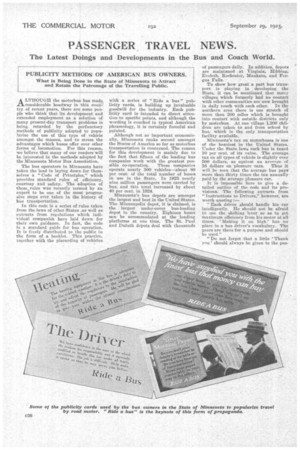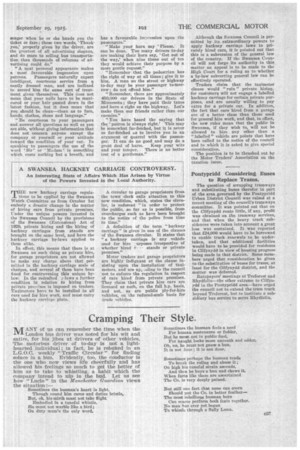PUBLICITY METHODS OF AMERICAN BUS OWNERS.
Page 20

Page 21

If you've noticed an error in this article please click here to report it so we can fix it.
What is Being Done in the State of Minnesota to Attract and Retain the Patronage of the Travelling Public.
A',THOUGH the motorbus has made, ...considerable headway in this couti-' try of recent years, there are some people who think that its development and extended employment as a solution of many present-day transport problems is being retarded by the perfunctory methods of publicity adopted to popularise the use of this type of vehicle amongst the masses, and to stress the advantages which buses offer over other forms of locomotion. For this reason, we believe that many of our readers will be interested in the methods adopted by the Minnesota Motor Bus Association.
The bus operators in Minnesota have :taken the lead in laying down for themselves a "Code of Principles," which provides standard rules of efficiency, courtesy and safety. The adoption of these,rules was recently termed by an expert to be one of the most progressive steps ever taken in the history Of bus transportation.
In this code is a series of rules taken from the laws of other States as well as extracts from regulations which individual companieS have laid down for their own guidance. In fact, the code is a standard guide for bus operation. It is freely distributed to the public in the form of a booklet. This practice, together with the placarding of vehicles
with a series of "Ride a bus " publicity cards, is building up inValuable goodwill for the industry. Each pubhefty card is intended to direct attention to specific points, and although the wording is couched in typical American phraseology, it is certainly forceful and pointed.
Although riot so important economically, Minnesota ranks second amongst the States of America so far as motorbus transportation is concerned. The reason for this development is mainly duo to the fact that fifteen of the leading bus companies work with the greatest pas
,sible co-operation. These companies operate nearly $00 vehicles—about 80 per cent, of the total number of buses in use in the State: In 1923 nearly nine million passengers were carried by bus, and this total increased by about 40 per cent. in 1924.
Minnesota's bus depots are amongst the largest and best in the United States. The Minneapolis depot, it is claimed, is the largest under-cover bus-loading depot. in the country. Eighteen buses oan be accommodated at the loading platforms at one time. The St. Paul and Duluth depots deal with thousands
of passengers daily. In addition, depots are maintemed at Virginia, Hibbing, EveIeth. Rochester, Mankato, and For, .gus Fails. '
To show how great a part but transport is playing in developing the State, it can be mentioned that many villages which formerly had no contact with other communities are now brought in daily touch with each other. In the northern area there is one stretch of more than 200 miles which is brought into contact with outside districts only by motorbus. At one village 1,200 children are taken to and from school by bus; which is the only transportation facility available.
Minnesota's tax on motorbuses is one of the heaviest in the United States. Under the State laws each bus is taxed 10 per cent, of its value. The averagetax on all types of vehicle is slightly over 500 dollars, as against an average of
16 dollars on pleasure cars. Thus it will be seen that the. average bus pays more than thirty times the tax annually paid by the average pleasure car.
It is impossible here to give a detailed outline of the code and its provisione. The following .extracts from " Instructions to Drivers," however, are worth quoting "Each driver should handle his car intelligently. He should not be afraid to u.se the shifting lever so as to get maximum efficiency from his motor at all times. Making it on high' has no place in a bus driver's vocabulary. The gears are therefor a purpose and should be used."
"Do not forget that a little 'Thank you' should always be given to the pas senger when he or she hands you the ticket or fare; those two words, 'Thank• you,' properly given by the driver, are the greatest of all advertising slogans, and do more to selling bus transportation than thousands of columns of advertising could do."
"A neat personal appearance makes a most favourable impression upon patrons. Passengers naturally expert intelligent, courteous service from a neatly dressed man, and are inclined to accord him the same sort of treatment given themselves. This does not mean that your nails have to be manicured or your hair pasted down in the latest fashion, but it does mean that you should be clean—clean as to face, hands, clothes, shoes and language."
"Be courteous to your passengers and answer all questions as well as you are able, without giving information that does not concern anyone except the company or yourself or your attitude toward the condition of your car. In speaking to passengers the use of the word ' Sir.' or Madam' is something which. costs nothing but a breath, and
has a favourable impression upon the passengers."
"Make your horn say 'Please. It can be done. Too many drivers to-day are making their horn say, Get out of the way,' when nine times out of ten they would achieve their purpose by a more gentle request."
"Remember that the pedestrian has the right of way at all times ; give it to him. A man on the street or highway to-day may be your passenger to-morrow; do not offend him."
"Remember, there are approximately 450,000 car drivers in the State of Minnesota ; they have paid their taxes and have a right on the highway. Let's make them our friends rather than our enemies."
"You have heard the saying that the 'patron is always right.' This may be somewhat far-fetched, but it is never so far-fetched ts to involve you in an argument or quarrel with the passenger. It can do no good and may do a great deal of harm. Keep your wits and your temper. There is no better test of a gentleman."






























